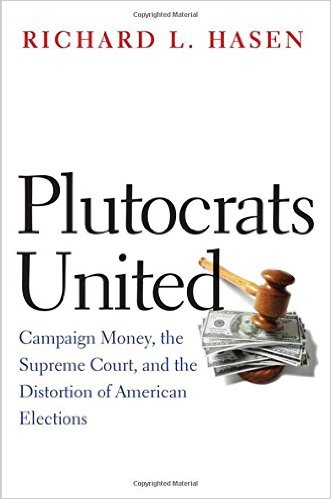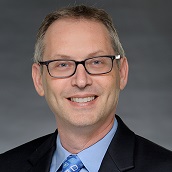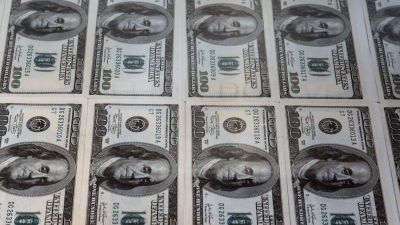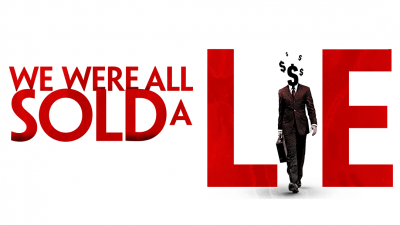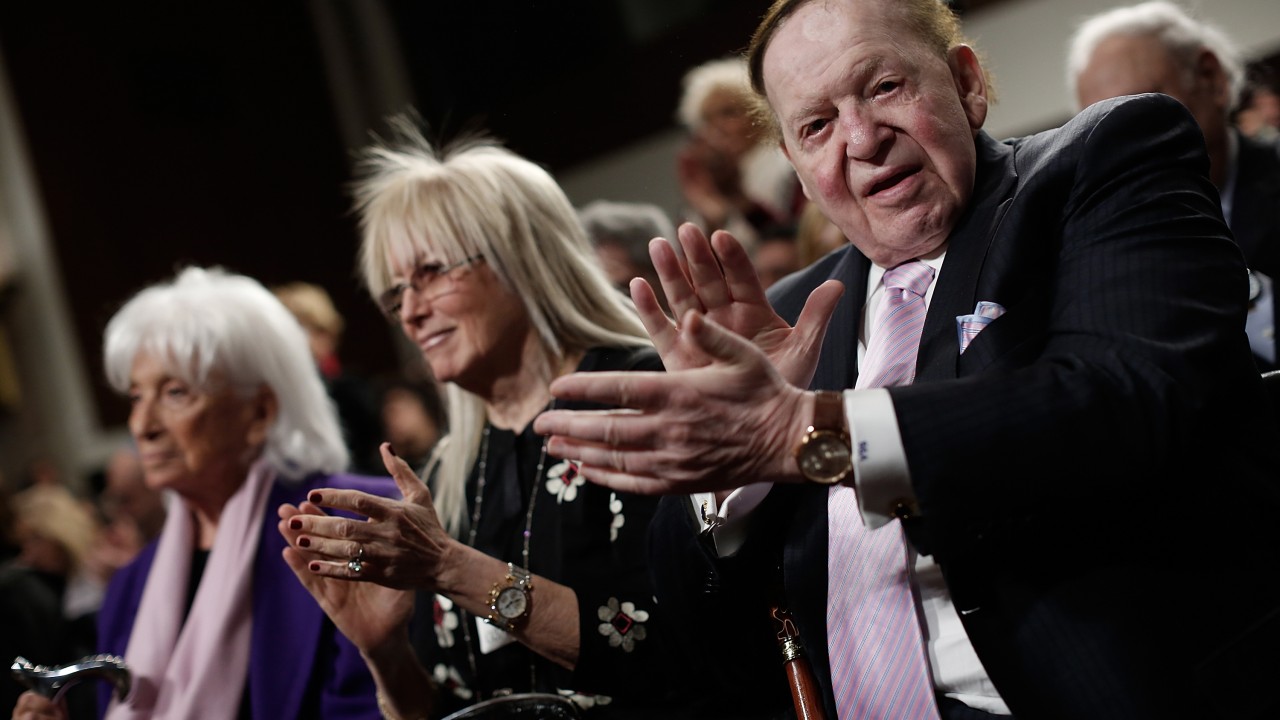
American businessman Sheldon Adelson (R) applauds during a roundtable discussion on Capitol Hill with his wife Miriam Adelson (C) and Marion Wiesel (L) March 2, 2015 in Washington, DC. Elie Wiesel, Sen. Ted Cruz and Rabbi Scmuley Boteach participated in a discussion entitled "The Meaning of Never Again: Guarding Against a Nuclear Iran." (Photo by Win McNamee/Getty Images)
This article is excerpted from Richard L. Hasen’s new book, Plutocrats United: Campaign Money, the Supreme Court, and the Distortion of American Elections.
The Chris Christie story was just too good for progressives to pass up, even though it obscured larger truths about the influence of money in American politics.
In the spring of 2014, a group of Republican presidential hopefuls, including Governor Christie of New Jersey, converged on the Venetian Hotel in Las Vegas to speak before the Republican Jewish Coalition and its key board member, the billionaire casino mogul and Venetian hotel owner Sheldon Adelson. It was a big moment for Christie, who was trying to get past a controversy over the closing of lanes on the George Washington Bridge allegedly in retaliation because Fort Lee’s mayor, a Democrat, did not support Christie’s reelection bid.
The speakers, the former Florida governor Jeb Bush, Ohio governor John Kasich, Wisconsin governor Scott Walker, and Christie, fell all over themselves to flatter Adelson and to announce their support for a continued strong relationship between the United States and Israel, Adelson’s signature issue. Walker, according to a New York Times story, “brought up his father’s trip to Israel, and said he puts ‘a menorah candle’ next to his Christmas tree. The name of his son, Matthew, actually comes from Hebrew, he pointed out.”
But Christie stepped in it. In his speech to the group, he “warmly recalled a trip he took with his family to Israel, calling it an extraordinary personal experience. But he touched off disapproving whispers from the crowd when he described flying over the ‘occupied territories’ where Palestinians live.” To conservative supporters of Israel, who believe Israel has a right to sovereignty over the West Bank and other areas captured in the Six-Day War in 1967, it was a faux pas to call them “occupied territories.” Christie quickly apologized in a private meeting with Adelson.
Progressives denounced the “line to kiss Sheldon Adelson’s boots” (or perhaps a bit higher up), the candidates’ “prostrat[ing] themselves, seeking Adelson’s stamp of approval and cash,” and Christie’s apology to Adelson for describing the disputed regions with a term regularly used by US presidents and the US government.
Who could blame these candidates for participating in the “Sheldon primary” or for their obsequiousness? Adelson and his wife had contributed an astounding $98 million to $150 million (thanks to holes in our campaign disclosure laws we are not sure exactly how much) to help elect Republican candidates during the 2012 election, including giving more than $15 million to a “super PAC” called “Winning Our Future” that seemed to single-handedly keep the former speaker of the House Newt Gingrich in the 2012 race for the Republican presidential nomination. The Adelsons later gave tens of millions more to support Mitt Romney’s run against President Barack Obama in the general election. The 2016 presidential hopefuls wanted Adelson’s support and, more importantly, his money.
But if the lesson progressives drew from the Chris Christie story was that big money is “buying elections,” the claim was off the mark. Instead, Adelson’s money bought Gingrich’s 2012 presidential campaign only a second (and third and fourth) look from Republican primary voters, but those voters ultimately rejected him. Romney beat Gingrich in the primary, but then, even with significant support from Adelson, lost to Obama in a campaign where each candidate and his party raised around a billion dollars.
So we can begin our consideration of the problem of money in American politics by rejecting the crass common liberal refrain that money simply buys elections… The eBay entrepreneur Meg Whitman’s $140 million in self-financed cash did not allow her to beat Jerry Brown to be California’s governor in 2010; the more she spent on her election ads, the less voters seemed to like her. Similarly, the environmentalist Tom Steyer’s efforts to keep a Democratic majority in the US Senate failed in the 2014 elections despite spending nearly $74 million. And in an electoral earthquake in 2014, Dave Brat, an unknown college professor with two full-time staffers, beat Eric Cantor, the House majority leader, in a Virginia congressional primary race. Cantor’s campaign spent more at steakhouses than his more conservative opponent spent on his entire campaign. The relationship between money and politics is the United States is more complicated than mere vote buying.
We can also reject the claim progressives sometimes make that campaign money “bribes” politicians. Take the group United Republic/Represent.Us. Represent.Us backs the proposed American Anti-Corruption Act. The website supporting the legislation is headed: “Get Money Out of Politics: Stop lobbyist bribery, End secret money & Empower voters.” Its first point for why the legislation is necessary: “Stop Politicians from Taking Bribes.”
But as Harvard professor and campaign reformer Lawrence Lessig explains, most members of Congress are not taking bribes, and that cash-for-votes corruption likely is as rare as it has ever been in Congress. Sure, there are the occasional stories: Republican Randy “Duke” Cunningham of California went to jail for getting a yacht and other goodies from defense contractors, and Democrat William Jefferson of Louisiana was caught in an FBI bribery sting in which he was arrested with $10,000 of literally cold cash in his freezer. But neither man was bribed by legal campaign contributions. Federal candidates legally can take no more than $5,400 from an individual across a two-year campaign cycle and just $5,000 from a political action committee. Who in Congress could be bought so cheap?
Super PACs such as the one supporting Gingrich cannot give their large sums directly to the candidates. But they can raise unlimited funds so long as they do not violate federal rules against “coordination” with candidates. The few members of Congress who take bribes are not taking them primarily through legal campaign contributions (at least not yet).
But reformers and reform groups Common Cause and Democracy 21 use the language of “corruption” all the time. Lessig, for example, has talked of the need for new laws to staunch “dependence corruption,” in which the “system” is corrupted by politicians dependent upon campaign funders to remain in office rather than on “the people alone.”
It is hard for reformers to avoid the corruption talk. To begin with, “corruption” resonates with the general public — a poll commissioned by Represent.Us saw support jump from 60 to 72 percent of Americans when a campaign finance reform bill is packaged as an anticorruption measure. Using the term broadly, corruption can mean anything deviating from some perfect state of nature. But there’s another, stronger reason why those in the election-reform business talk so much about “corruption” in American politics, a reason that has distorted Americans’ thinking and talking about money in politics for decades. The Supreme Court.
In 1976, the Court decided Buckley v. Valeo, upholding some parts of a 1974 federal campaign finance law and striking down others. Buckley held that campaign finance limits complied with the United States Constitution’s First Amendment guarantee of freedom of speech and association only if they could be justified by the government’s interest in preventing “corruption” or the “appearance of corruption.” The Court rejected the idea that the government could limit money in politics to promote political equality as “wholly foreign to the First Amendment.”
This singular focus on corruption explains the Supreme Court’s constantly shifting approach to the constitutionality of campaign laws. Liberal justices read the term “corruption” broadly and vote to uphold many limits. Conservative justices read it narrowly and vote to strike down just about everything — witness the era of skepticism we are in right now. This is why a host of reformers and academics try to shoehorn a variety of reasons to limit money in politics under the label “corruption.”
Justice Anthony Kennedy, writing for the Supreme Court in 2010 in Citizens United v. Federal Election Commission, explained that when large donors and spenders ingratiate themselves with elected officials to secure access to them, it is not corruption. “Ingratiation and access” or the appearance of ingratiation and access thus provide no basis for limiting money in politics. Citizens United, a 5–4 decision pitting the Court’s conservatives against its liberals, opened a new era of corporate and union spending in federal elections and fueled the emergence of super PACs and other outside spending groups.
In a case decided in 2014, McCutcheon v. Federal Election Commission, Chief Justice John Roberts went even further, celebrating the idea of politicians responding to the wishes of big donors and spenders. Not only are “ingratiation and access” afforded those making large campaign contributions not corruption, Roberts explained. Donors “embody a central feature of democracy — that constituents support candidates who share their beliefs and interests, and candidates who are elected can be expected to be responsive to those concerns.” In a democracy, Roberts tells us, we should want politicians to be responsive to big donors.
The new Citizens United era is not full of corrupt politicians taking bribes or of elections going to the highest bidder. To claim it is so puts the public’s spotlight in the wrong place, looking for elected officials to use large amounts of money for private gain. The more central problem of money in politics is something just as troubling but much harder to see: a system in which economic inequalities, inevitable in a free market economy, are transformed into political inequalities that affect both electoral and legislative outcomes. Without any politician taking a single bribe, wealth has an increasingly disproportionate influence on our politics. While we can call that a problem of “corruption,” this pushes the limits of the words too far (certainly far beyond what the Supreme Court is going to entertain as corruption) and obscures the fundamental unfairness of a political system moving toward plutocracy. The political power of the wealthy is especially troubling in our current period of rising economic inequality, when those with great economic clout can use their increased political power to protect their economic position.
Most of the important money-in-politics action happens not in the glare of the television cameras at the Venetian in Las Vegas, but in steakhouses and on golf courses all around Washington, DC, where lobbyists — often former senators, members of congress, or staffers — do their ingratiation and secure their access. There is a reason big business pays lobbyists so well, and it is not that lobbyists are information specialists who help create sound public policy. Lobbyists secure access both by bundling campaign contributions and by using personal connections. It should be no surprise that half of retiring senators become lobbyists, many with seven-figure salaries, and that lobbyists who used to work for a US senator see their income fall by nearly a quarter when that senator retires.
Money works especially well in the shadows. Lobbyists, like mushrooms, thrive in low light. A recent study about a one-time special tax rule passed as part of the American Jobs Creation Act of 2004 shows that 93 companies lobbied for its passage, spending a total of $282.7 million to obtain overall tax benefits of $298 billion, with savings of approximately $88 billion for those 93 companies.
Money could not stop the passage of the Dodd-Frank bill, which regulated the securities industry against the industry’s wishes: public outrage over the 2008 financial crisis was just too great to overcome. But once public attention faded, moneyed interests could work their magic, using influence to water down implementing legislation and regulations and stalling or stopping much of what Dodd-Frank promised to achieve.
In the new era of super PACs and non-disclosing “social welfare” groups spending millions of dollars on elections, it is no longer just access that matters. Money’s potentiality is sometimes enough to cause a skew. Just the threat of large money being spent against an elected official sometimes seems enough to get that official to shift priorities, a point that former senators (but less often current ones) publicly acknowledge.
The result is that money systematically skews US public policy even if it does not buy elections. As Professor Martin Gilens of Princeton University and Benjamin Page of George Washington University recently demonstrated, public policy across a wide range of issues regularly skews toward the interests of the wealthy and well organized, and against the poor and disorganized. With the new wave of campaign finance deregulation giving the wealthy more chances to leverage their influence, there is every reason to believe the trend will accelerate.
In the electoral realm, money matters even when it does not dictate the outcomes of elections. As we have seen, Newt Gingrich got a second (and third and fourth) shot at the Republican presidential nomination not because that was what most Republican voters wanted, but because it is what Sheldon Adelson wanted. Meg Whitman got her chance to convince Californians that she would be a better governor than Jerry Brown only because she had millions of dollars to burn on her campaign. No doubt thousands of other Californians were equally convinced they would be good governors, but they did not have $140 million to buy that chance.
Further, while advertising alone does not necessarily sway voters who are engaged and have strong political opinions, in a close election it could sway enough swing voters — generally the least informed and most easily persuadable voters — to affect the outcome.
Lessig is exactly right that politicians depend on the funders, not only the people, for their jobs — there is a reason political scientists refer to the “money primary,” which occurs before the actual primary. This raises a concern, however, not about corruption, but about wealthy donors’ disproportionate influence over elections and policy.
Why not simply limit money in politics to promote a level playing field? Leveling the ability to contribute and spend money on politics would not create perfect equality in political power (and we would not want perfect equality even if we could get it), but it would be a reasonable step in that direction. Yet depending on how society writes and implements such laws, limits could have profoundly bad effects: censoring political activity, entrenching incumbents over challengers, or giving special treatment to media corporations. These are not trivial concerns, and any argument to limit money in politics cannot simply sweep them aside in the name of important social interests. Most reformers simply ignore the hard arguments; in this book I confront these challenges head on.
Courts grapple with these issues when opponents of regulation challenge campaign laws as violating the First Amendment. That amendment provides, among other things, that “Congress shall pass no law . . . abridging the freedom of speech.” The words of the First Amendment are not self defining, and ever since Buckley the Supreme Court has vacillated over how to strike a balance between individual rights and society’s interests.
In the past, it sometimes upheld limits on corporate money in politics essentially on political equality grounds (dressed up in anticorruption garb). These days, however, the conservative majority on the Court, over the strenuous objections of the more liberal justices, has embraced the First Amendment attack on campaign finance.
The First Amendment critique is serious, yet many Democrats ignore it. In 2014, 43 Democratic senators co-sponsored a proposed constitutional amendment to “overturn” the Citizens United decision. The amendment’s text raised concerns about free speech and political competition that Democrats dismissed without making a serious response.
Mostly, Democrats pay lip service to campaign finance reform. The former Senate majority leader Harry Reid has repeatedly attacked the libertarian Koch brothers and their network of supporters for funneling hundreds of millions of dollars into federal, state, and local elections, much of it without any disclosure of donors. Reid has claimed that Republicans are “addicted to Koch,” and there is merit to his claim that Republicans increasingly depend on large donors for their campaigns. But Reid is a Koch addict too: he uses the brothers as a political foil to raise funds for Democrats. (Perhaps unsurprisingly, Reid did not say a word against his fellow Nevadan Sheldon Adelson, perhaps out of fear that Adelson would finance a Republican opponent for his Senate seat.) In any case Democrats too are increasingly dependent on large money, and money skews their priorities as well; the party has done a great job protecting the interests of Wall Street.
Although Democrats in office tend to rail against Citizens United and the Supreme Court, some Democratic lawyers and politicos are secretly ecstatic about the brave new world of campaign finance the Supreme Court is creating. In the close 2014 race for control of the US Senate, Democratic-leaning super PACs outraised their Republican counterparts. Democrats in 2014 were the ones who engineered a congressional deal to vastly increase the contributions political parties could accept. President Obama has been a master of hypocrisy — castigating the Supreme Court for opening the floodgates of money but undermining the public financing system for presidential campaigns. He was the first candidate to decline public money in the general election, a perhaps reasonable choice at the time given the inevitability of the program’s collapse, but he reneged on his promise to propose a fix for the future. Indeed, he became the first president to transform his presidential campaign committee into a “social welfare” group that can take unlimited and secret donations to support his agenda. The group, now called “Organizing for Action,” is voluntarily disclosing the names of donors giving at least $250.
While Democrats try to have it both ways on campaign finance, Republicans have united behind a deregulatory agenda. The John McCains of the party, who used to be leaders in supporting bipartisan reform efforts, have gone silent on the issue, while the Mitch McConnells, who have long fought limits but called for full and easy disclosure of donors’ identities, now fight the disclosure laws they used to support. Senator Ted Cruz of Texas has grandstanded on the issue, declaring that “Senate Democrats are seeking unfettered power to regulate and stifle political speech.”
As with many other issues that now divide along party lines, the debate thus lacks nuance. Even on the merits, it has been hampered by the Supreme Court’s insistence that any justifications for limits be phrased in anticorruption terms, and the willingness of activists and scholars to go along with this unhelpful framing.
This book proposes that we think of campaign finance limits differently, as a means of promoting and preserving political equality. First Amendment critics are right that limiting money in elections raises the risk of censorship, incumbency protection, and unfair preferential treatment of the media. The task, difficult but essential, is to develop a plan that both protects robust political speech in elections and guards against the rise of a plutocratic class that has too much influence over both the outcome of elections and what elected officials do once in office. I argue that under certain circumstances, campaign limits to promote political equality are constitutional. Promoting political equality is a compelling interest that can justify measures that do not squelch too much political speech or inhibit robust political competition.
Any system of limits on money in politics likely must include subsidies for political activity to ensure robust, competitive elections in which many voices are heard. We need to put campaign finance vouchers in the hands of all voters to fund and democratize our elections. In this book I propose a “voucher + limits” program in which we give each voter $100 in campaign finance vouchers per two-year congressional cycle, to donate to candidates, parties, and interest groups (such as the Sierra Club or the National Rifle Association). Further, no individual could contribute or spend in the aggregate more than $25,000 for any single federal election or $500,000 on all federal elections in a two-year election cycle. These rules will be supplemented by other ones, such as those that limit the campaign finance activities of lobbyists.
It is a careful balancing act, but this program is both constitutionally defensible and as central to fair elections as the “one person, one vote” principle, which says that no eligible voter should have more voting power than another. The $25,000 individual limit is a big compromise on political equality — it still gives one wealthy person 250 times more influence (or much more than that, if the person contributes or spends in multiple races) than someone who cannot afford to give beyond the voucher dollars. But this generous limit helps promote robust political speech, helps ensure competitive elections and multiple paths for challenging incumbents, and may insulate the program from court challenge.
[T]he answer to the problem of money in politics is political change. We need a Supreme Court that will accept political equality as a compelling interest that justifies reasonable campaign regulations, and to build the jurisprudence necessary for a new progressive Supreme Court. That Court cannot come until after the retirement of four older justices currently sitting on it, which would open up the potential for a new progressive majority.
This book sets out new thinking about how to rescue our politics from plutocracy. We need to move beyond a partisan world in which Chris Christie bows before Sheldon Adelson and in which Democrats propose futile amendments to “overturn Citizens United” while engaging in fundraising practices similar to Republicans. We should think through these issues before American democracy is too far skewed toward the interests of the wealthy, in the hope that some future Supreme Court proves willing to accept reasonable limits on money in politics. This book offers a way to advance the goal of political equality to resolve the inevitable tension between free economic markets and voter equality.
Excerpted from Plutocrats United: Campaign Money, the Supreme Court, and the Distortion of American Elections by Richard L. Hasen, on sale now from Yale University Press.

